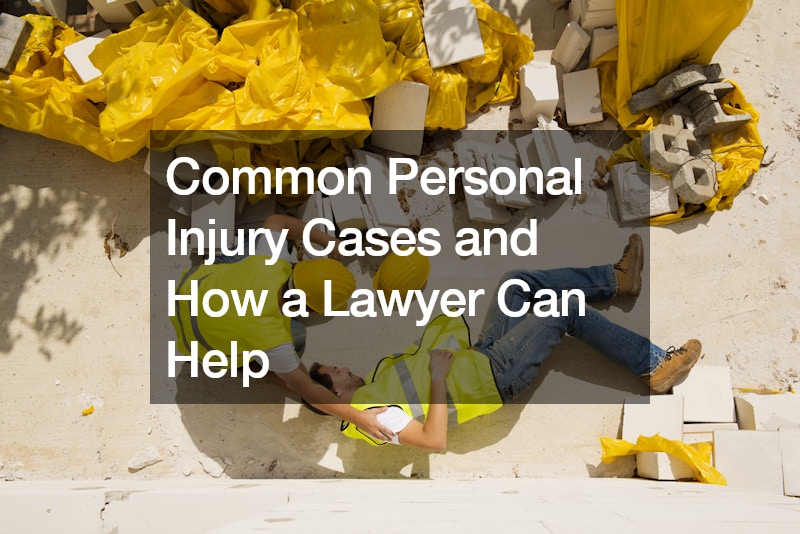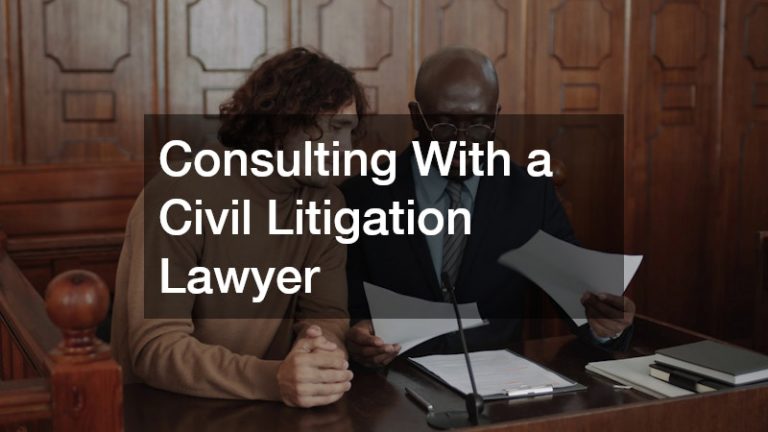

Navigating the complexities of personal injury cases often requires the expertise of a knowledgeable personal injury lawyer. These professionals specialize in advocating for individuals who have suffered harm due to accidents or negligence, aiming to secure just compensation for their clients’ losses.
1. What is a Personal Injury Case?

A personal injury case arises when an individual sustains harm, whether physical, emotional, or psychological, due to the actions or negligence of another party. This area of law, overseen by personal injury lawyers, encompasses a wide range of incidents, including automobile accidents, workplace injuries, medical malpractice, product defects, and premises liability. The legal framework governing personal injury cases is rooted in tort law, which establishes liability and compensatory remedies for victims who suffer harm through no fault of their own.
Personal injury lawyers play a pivotal role in defining and pursuing these claims. They investigate the circumstances of the incident, gather evidence, consult with expert witnesses, and negotiate with insurance companies or opposing counsel to achieve a fair settlement or advocate in court if necessary. Their goal is not only to obtain financial compensation for medical bills, lost wages, and pain and suffering but also to hold responsible parties accountable for their actions or negligence.
2. How to Determine Liability in a Personal Injury Case?
Determining liability in a personal injury case hinges on proving negligence, which involves demonstrating that the defendant breached a duty of care owed to the plaintiff, resulting in injury or harm. A local personal injury attorney assists by conducting a thorough investigation into the circumstances surrounding the incident. This includes gathering witness statements, analyzing relevant documents, and consulting experts to establish how the defendant’s actions or inactions led to the plaintiff’s injuries.
In cases where multiple parties may share fault, comparative fault principles come into play. This doctrine allows for a percentage of responsibility to be assigned to each party involved based on their degree of negligence. Additionally, strict liability may apply in certain cases where the defendant is held responsible regardless of fault, such as in product liability claims involving defective products that cause harm. Personal injury lawyers navigate these legal complexities to build a compelling case for their clients, ensuring that liability is accurately determined and that victims receive the compensation they deserve.
3. What are Common Types of Personal Injury Claims?

Personal injury claims encompass diverse scenarios where individuals suffer harm due to others’ actions or negligence. Among the most common are car accident claims, where auto accident attorneys play a crucial role in negotiating settlements or litigating on behalf of injured parties. Slip and fall accidents, often occurring on poorly maintained premises, lead to premises liability claims where property owners may be held accountable for negligence.
Medical malpractice claims arise from healthcare providers’ failure to adhere to accepted standards of care, requiring specialized expertise from a malpractice lawyer to navigate complex medical and legal issues. These claims seek compensation for injuries caused by diagnostic errors, surgical mistakes, medication errors, or inadequate treatment. Each type of personal injury claim requires specific legal knowledge and strategic advocacy to ensure victims receive adequate compensation for their losses.
4. How is Compensation Calculated?
Compensation in personal injury cases is calculated based on various factors that quantify the losses and harm suffered by the victim. Lawyers specializing in personal injury law meticulously assess economic damages, which include medical expenses, lost wages, rehabilitation costs, and property damage directly attributable to the incident. These damages are typically supported by documentation such as medical bills, pay stubs, and repair estimates.
Non-economic damages, such as pain and suffering, emotional distress, loss of enjoyment of life, and loss of consortium, are more subjective but equally important. Personal injury lawyers advocate for fair compensation for these intangible losses, often relying on expert testimony and psychological evaluations to demonstrate their impact on the victim’s life. In cases where the defendant’s conduct is deemed particularly egregious, punitive damages may be awarded to punish wrongdoing and deter similar behavior in the future.
Navigating the complexities of calculating compensation requires a thorough understanding of legal precedents, economic principles, and the specific circumstances of each case. Experienced personal injury lawyers leverage their knowledge and resources to build a compelling case for maximum compensation, ensuring that their clients receive adequate financial recovery for the full extent of their injuries and losses.
5. What is the Statute of Limitations for Personal Injury Cases?

Understanding the statute of limitations is crucial in personal injury cases as it dictates the timeframe within which a lawsuit must be filed after an injury occurs. This legal deadline, overseen by personal injury law offices, varies depending on the type of injury and jurisdiction. Typically, statutes of limitations range from one to several years from the date of the incident or discovery of harm. Missing this deadline can result in the dismissal of your case, making it essential to consult with a personal injury lawyer promptly after an injury to ensure timely filing and preservation of your legal rights.
Exceptions to the statute of limitations may apply in certain circumstances, such as cases involving minors or individuals who were incapacitated at the time of the injury. These exceptions extend the timeframe for filing a claim beyond the standard limitations period, offering victims additional opportunities to seek justice and compensation. A knowledgeable personal injury lawyer is well-versed in these exceptions and can navigate the complexities to ensure compliance with deadlines specific to your case.
Additionally, personal injury lawyers play a critical role in managing deadlines and procedural requirements throughout the legal process. They meticulously prepare and file necessary paperwork, including complaints, motions, and responses, to initiate and advance your claim effectively. By partnering with a skilled attorney early on, you can mitigate the risk of missing critical deadlines and focus on recovering from your injuries while your legal rights are protected.
6. What Steps Should You Take After an Injury?
After sustaining an injury, taking immediate steps can significantly impact the outcome of your personal injury claim. Seeking prompt medical attention is paramount not only for your health but also for documenting the extent and cause of your injuries. Dog bite lawyers emphasize the importance of detailed medical records, which serve as crucial evidence in substantiating your claim and linking your injuries to the incident.
Documenting evidence is another crucial step in building a strong case. This includes gathering witness statements, taking photographs of the accident scene or hazardous conditions, and preserving any physical evidence that may support your claim. Personal injury lawyers leverage this evidence to establish liability and demonstrate the impact of the defendant’s actions on your life.
Consulting with a personal injury lawyer early in the process is essential to understanding your legal options and protecting your rights. A knowledgeable attorney assesses the circumstances of your injury, advises you on potential claims and strategies, and handles communication with insurance companies or opposing parties on your behalf. By enlisting legal representation early, you can avoid common pitfalls, ensure thorough documentation of your injuries and losses, and pursue fair compensation effectively.
7. How Do Personal Injury Settlements Work?

Personal injury settlements offer an alternative to lengthy court trials, providing timely resolution and closure for victims. Negotiated settlements, facilitated by personal injury lawyers, involve discussions between parties to reach an agreement on compensation without court intervention. This process allows for flexibility in crafting a settlement that addresses the specific needs and losses of the injured party.
Structured settlements are another form of resolution where compensation is paid out in periodic installments over time, often tailored to cover ongoing medical expenses or future care needs. Personal injury lawyers advocate for their clients during settlement negotiations, ensuring that the proposed settlement adequately reflects the full extent of their injuries, losses, and future financial requirements.
Negotiation skills are essential in achieving a favorable settlement outcome. Personal injury lawyers leverage their experience, knowledge of case law, and understanding of economic damages to present a compelling case for fair compensation. They engage in strategic negotiations, considering both the strengths and potential weaknesses of the case, to achieve the best possible outcome for their clients while avoiding the uncertainties and costs associated with litigation.
8. How to Choose a Personal Injury Lawyer?
Choosing the right personal injury lawyer can significantly impact the outcome of your case. It’s essential to look for qualifications and experience that align with your specific needs. Criminal attorneys specializing in personal injury law bring unique skills to the table, including trial experience, negotiation prowess, and a deep understanding of insurance tactics. When selecting a lawyer, consider their track record of success in handling cases similar to yours, as well as their reputation within the legal community and among past clients.
Asking pertinent questions during initial consultations can help assess whether a lawyer is the right fit for your case. Inquire about their approach to personal injury claims, their communication style, and their willingness to handle your case personally rather than delegating it to junior associates. Transparency regarding fees is crucial; many personal injury lawyers work on a contingency fee basis, meaning they only get paid if you receive compensation. This arrangement aligns the lawyer’s interests with yours, motivating them to pursue the maximum recovery possible.
Contingency fee arrangements also alleviate financial concerns for clients, allowing them to access legal representation without upfront costs. Personal injury lawyers committed to transparency and client-centered service will outline all potential costs and fees upfront, ensuring you have a clear understanding of financial obligations before proceeding with your case.
9. What are the Benefits of Hiring a Personal Injury Lawyer?
Hiring a personal injury lawyer offers numerous benefits, starting with their legal expertise and understanding of complex laws and procedures. DUI attorneys specializing in personal injury cases possess the knowledge and resources to thoroughly investigate your claim, gather compelling evidence, and build a strong case for compensation. They collaborate with medical experts, accident reconstruction specialists, and economists to assess the full impact of your injuries and losses, ensuring no detail is overlooked.
Efficiency is another advantage of hiring a personal injury lawyer. Experienced attorneys streamline the claims process, navigating bureaucratic red tape and handling paperwork on your behalf. They communicate with insurance companies and other parties, negotiating from a position of strength to secure a fair settlement or, if necessary, litigating aggressively in court to uphold your rights. Their goal is to maximize your compensation while alleviating the stress and burden of legal proceedings, allowing you to focus on your recovery and well-being.
Moreover, personal injury lawyers have a proven track record of achieving favorable outcomes for their clients. Their courtroom experience and negotiation skills enable them to anticipate and counter insurance company tactics aimed at minimizing payouts. By partnering with a dedicated personal injury lawyer, you gain a powerful advocate who is committed to advocating for your rights and ensuring that justice is served.
10. What to Expect During a Personal Injury Lawsuit?
A personal injury lawsuit follows a structured process designed to resolve disputes and determine liability for injuries and damages. Pre-trial procedures include discovery, where personal injury lawyers exchange information and gather evidence through depositions, requests for documents, and interrogatories. During this phase, your lawyer prepares your case by compiling evidence, identifying witnesses, and consulting with experts who may testify on your behalf.
The trial process involves presenting your case before a judge and jury. Personal injury lawyers deliver opening statements, examine witnesses, and present evidence to support your claims of negligence and damages. They skillfully cross-examine opposing witnesses to challenge their credibility and expose inconsistencies in their testimony. Throughout the trial, your lawyer advocates passionately for your rights, aiming to persuade the jury of the defendant’s liability and the extent of your injuries.
Post-trial actions may include motions for post-trial relief or appeals if either party disputes the verdict. Personal injury lawyers continue to represent your interests during these proceedings, seeking to uphold favorable judgments or challenge adverse rulings. Their dedication to your case extends beyond the courtroom, ensuring that you receive comprehensive legal representation from start to finish.
Navigating personal injury cases requires comprehensive understanding and strategic legal guidance. Consulting with a skilled personal injury lawyer ensures your rights are protected and maximizes opportunities for fair compensation. By addressing critical questions and complexities, this article underscores the importance of legal expertise in achieving favorable outcomes in personal injury claims.



